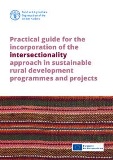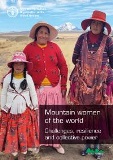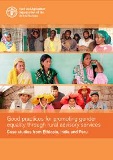Publications

Guyana: Country gender assessment of the agriculture and rural sector
01/03/2023
In alignment with the FAO Policy on Gender Equality 2020-2030, the Assessment describes women’s and men’s specific roles and opportunities in agriculture, and explores the impact of existing gender inequalities on both women’s empowerment and rural development. Rural women are among the main contributors to food production and food processing in Guyana yet women’s access to both productive resources and services is limited. 66 p.

Practical guide for the Incorporation of the Intersectionality approach in sustainable rural development programmes and projects
01/01/2023
This guide aims to provide an overview of innovative and culturally sensitive work methodologies for identifying inequalities and present an intersectional action and transformation strategy for planning and implementing policies to collaborate with rural populations. 55 pp.

Gender equality and women's empowerment in food and agriculture - Kenya
01/01/2023
This initiative adopts holistic, integrated and transformative approaches to tackle deep-rooted causes of gender inequalities. It engages both women and men in sensitization, capacity development, dialogue, analysis, and action over gender equality, collective action, local issues and farm business for a better life. 2 pp.

Unlocking women’s capacity to become agents of change in the fight to reduce child labour in agriculture in Pakistan
12/12/2022
This fact sheet presents the areas of intervention implemented as part of the project by FAO in Pakistan as well as their approaches and results with a focus on the lessons learned from empowering women with knowledge, skills and means to start their own businesses. 8 pp.

FAO Europe and Central Asia Gender Newsletter, December 2022 - Issue #9
01/12/2022
In each quarterly issue, the reader meets our real heroes and reads their stories: how communities, especially women from remote villages, strive to achieve a better life and how FAO together with various partners and governments stand hand-in-hand with them to achieve effective results. 6 pp.

Mountain women of the world – Challenges, resilience and collective power
01/12/2022
This publication highlights the stories and voices of mountain women, with a focus on rural areas and mountain tourism, and outlines a path forward to promote their empowerment and help them to realize their potential as agents of sustainable mountain development. 68 pp.

Good practices for promoting gender equality through rural advisory services
01/12/2022
This objective of this publication is to support RAS providers to adopt and adapt these good practices so that they can design and deliver truly gender-responsive services. 96 pp.

Strengthening gender-responsive climate policies and actions in aquaculture and fisheries
01/11/2022
This brief showcases promising research and innovation, particularly from countries engaged through FAO's Flexible Multi-Partner Mechanism (FMM) 149 project. Samoa, Uganda and Belize are highlighted as examples to inform policymakers, guide gender-responsive investments, policies, and strategies in countries’ work in response to climate change. 7 pp.
